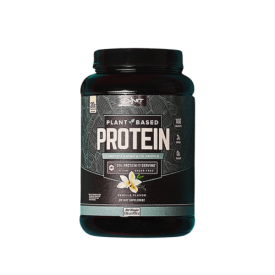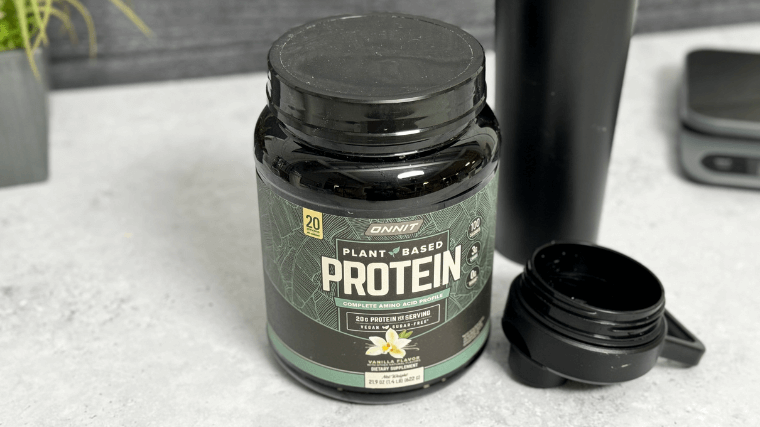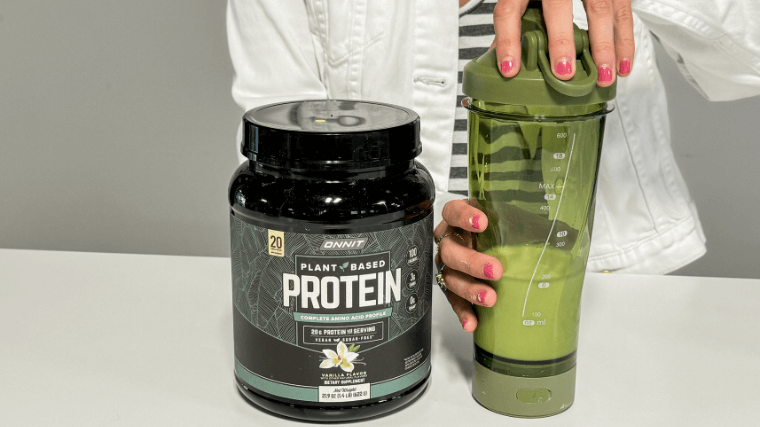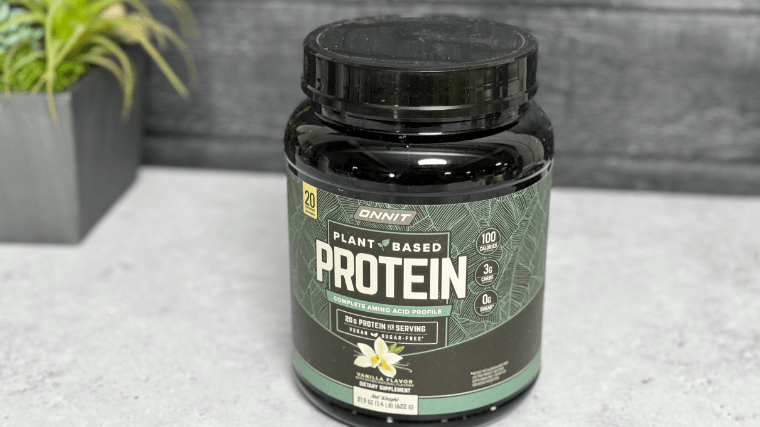Onnit is a one-stop shop for many of your fitness needs, with offerings ranging from chip-proof kettlebells, supplements formulated to rev up your memory and focus, and protein powders to help support muscle growth. Our team of testers and registered nutrition experts contributed to this Onnit Plant-Based Protein review, comparing their experience with this pea and seed-based protein against some of the best protein powders available.
We’ve tested nearly 150 protein powders, and to provide you with a clear understanding of how this product stacks up against the competition, we’ve utilized the BarBend supplement testing methodology to provide scores in categories such as taste, side effects, formulation, and price. Overall, we like that this plant-based protein features a complete amino acid profile, making it a great source of high-quality protein for those averse to dairy. Read on for our full review.

This plant-based protein powder is dairy, soy, and gluten-free, with 20 grams of protein, 1 gram of fat, and 3 grams of carb in each 100-calorie serving
Medical disclaimer: The content on BarBend is meant to be informative in nature, but it should not be taken as medical advice. The opinions and articles on this site are not intended for use as diagnosis, prevention, and/or treatment of health problems. It’s always a good idea to talk to your doctor before beginning a new fitness, nutritional, and/or supplement routine. Individual needs for vitamins and minerals will vary.
Main Takeaways
- Provides 21 grams of plant-based protein in each serving
- Complete protein and amino acid profile sourced from pea, pumpkin seed, sunflower seed, and watermelon seed protein
- Relatively expensive at $2.25 per serving
Onnit Plant-Based Protein Specs
| Price Per Serving | $2.25 |
| Protein Per Serving | 21g |
| Calories Per Serving | 110 |
| Flavors | Chocolate |
| Protein Source | Pea, pumpkin seed, sunflower seed, watermelon seed |
| Third-Party Tested | Yes (Informed Sport) |
“Each serving of Onnit’s plant-based protein powder provides an impressive 21 grams of protein. And you get a blend of several nutritious protein sources, including pea, pumpkin seed, watermelon seed, and sunflower seed protein,” says Chelsea Rae Bourgeois, registered dietitian and BarBend expert contributor.
This mixture of protein sources covers all of the bases, offering all of the essential amino acids. (1) “A complete protein refers to a protein source that contains all 9 essential amino acids, this is considered superior because you have all the necessary building blocks for muscle growth, repair, and hormone synthesis, as well as other support like to hair, skin and nails,” says Leona West Fox, BarBend expert contributor and Integrative Functional Nutritionist. “This is why it’s important to… purchase a brand that combines them.”

There are 20 servings in each container, and each serving costs about $2.25, which is above the average $1.25 to $2 cost per serving we see with many of the best whey protein powders. However, if plant protein is a must to support your plant-based diet or dairy sensitivity, the cost is typical for vegan protein powders, which tend to come in between $2 and $3 per serving.
Who Should Use / Who Shouldn’t Use Onnit Plant-Based Protein
We are living in a great time for protein supplements, with thousands of options available regardless of your preference, dietary restrictions, or desired macros. While this abundance can seem overwhelming, we’ve chalked up exactly who would and who wouldn’t benefit from bringing home a tub of Onnit Plant-Based Protein.
Recommended for:
- Those looking for a dairy-free protein source
- Individuals following a low-carb or keto diet, or who prefer to get their carbohydrates from real food
- Plant-based dieters who struggle to get enough protein
Not Recommended for:
- Lifters on a budget
- Anyone who likes to have multiple shakes (or double scoop) every day
- People who prefer a product with multiple flavors
Our Experience Using Onnit Plant-Based Protein
The BarBend team is filled with athletes, certified personal trainers, nutritionists, and desk jockeys looking to build and maintain muscle while balancing a 9-to-5. We’ve dabbled in greens powders, pre-workouts, protein shakes, and some of the best creatine supplements, all in the search for the best products to support sports nutrition, training, and muscle gain. We put Onnit Plant-Based Protein to the test, adding it to blender bottles and downing the mixture whenever we needed a boost of protein.
To provide you with the clearest understanding of our testing, we’ve rated categories such as solubility, third-party testing, ingredients, and more on a scale of 1 (not good) to 5 (A+). We’ll get into all of the details below.
Ingredients and Formulation
Onnit scored an impressive 4 out of 5 for its formulation with Chelsea Rae Bourgeois, BarBend expert contributor and registered dietitian. “Onnit’s Plant-Based Protein features an impressive ingredients list and nutrition profile,” says Bourgeois. “With 21 grams of protein and minimal carbohydrates and fat, it’s a lean option for those on a plant-based diet in need of some extra protein.”
With this amount of protein, 3 grams of carbs, and 1.5 grams of fats, this may be an ideal lean protein powder to support weight loss or body recomposition when paired with resistance training. (2)
However, one area we found worth a callout was the sodium content. “Each scoop of Onnit’s Plant-Based Protein contains 430 milligrams of sodium, which is around 19% of the recommended limit for the average healthy adult,” says Bourgeois. “If you lose a lot of sweat, this might not be a dealbreaker. But it’s definitely worth noting.”
The FDA recommends a limit of sodium intake for adults to be less than 2,300 milligrams per day, though additional studies have suggested that the ideal amount of sodium is 1,500 milligrams per day. (3)(4) What’s more, endurance athletes will want to consume 300 to 600 milligrams of sodium per hour while competing or training. (4)

Lastly, leucine, a branched-chain amino acid (BCAA), is an important amino acid for muscle growth. (5) While whey protein powders tend to have between 2 and 3 grams of leucine, a majority of plant-based powders fall much lower than this. (6) Onnit recognized this disparity and added additional leucine into their formulation, providing 2.3 grams per serving.
Taste
“I’ll be the first to admit that I don’t usually like plant-based protein powders,” says our tester. “But this Chocolate flavor was really good. It’s got this familiar chocolate milk type of flavor.” They gave high marks for taste, providing a 4 out of 5 score in this category. This is high praise, seeing as how our list of the best-tasting protein powders is primarily comprised of whey protein powders.
While many of the plant-based protein powders we’ve tried can have a gritty taste and texture, Onnit’s made an effort to mask this grit (often caused by pea protein) with their inclusion of “Smooth Protein” — aka, pumpkin seed protein powder — which helps create a more creamy consistency.
Cocoa powder is the third ingredient listed on the nutrition label, meaning it’s the third most-used ingredient. You won’t find any artificial sweeteners or added sugars, but instead, stevia extract, monk fruit extract, and sea salt are added to boost the flavor profile.
Solubility
Even some of the best vegan protein powders can be a pain to mix, especially in comparison to whey protein options. However, we were surprised at how well Onnit Plant-Based Protein powder dissolved in our blender bottle.
“I added water to a scoop of this powder, shook it a bit in my blender bottle, and while the end result was a little on the thin side, there weren’t any lumps or sediment that dropped to the bottom,” says our tester, who gave solubility a 4 out of 5. However, they did warn that you’ll likely still get a little grit, as that’s often inevitable with plant-based protein powders.
Price Per Serving
If you’re looking for ways to eat healthy on a budget, adding Onnit Plant-Based Protein to your plate may not be ideal. For $44.95, you get a tub with 20 servings, which comes out to a hefty price of $2.25 per serving. If you plan to double scoop or have two shakes a day, you’ll plow through this tub in a little over a week!
This cost is in the higher range of typical protein powders (between $1.25 and $2 per serving on average) and standard for plant-based protein powders (between $2 and $3 per serving). This price per serving scored a 1 out of 5, a large reason why the overall score dropped to 3.9 out of 5.
Third-Party Testing
Onnit provides third-party testing for some of their products, utilizing Informed Sport, one of the most respected third-party testing certifications for dietary supplements. Onnit Plant-Based Protein is verified by Informed Sport, which tests for banned or prohibited substances. Our tester gave this category a perfect 5 out of 5.
What to Consider Before Buying Onnit Plant-Based Protein
After testing almost 150 protein powders, we’ve gleaned a thing or two about what to consider when choosing the right protein powder based on your preferences, needs, and goals. The following are areas to mull over before making your purchase.
- Vegan: If you’re following a vegan diet, you’ll want an option such as this that utilizes plant proteins (pea, pumpkin seed, sunflower seed, and watermelon seed protein sources) instead of a whey or casein protein.
- Leucine Content: “If a person is taking protein powder specifically to fill any protein gaps in the day and after their workout to maximize protein muscle synthesis then it’s important to choose protein powder with a higher leucine content,” says Leona West Fox, Barbend expert contributor and Integrative Functional Nutritionist. You’ll find 2.3 grams of leucine in each serving of Onnit Plant-Based Protein, which brings you closer to the 3 to 4 grams per meal that studies suggest can prevent muscle loss. (7)
- Price: If you don’t really want/need a vegan protein powder, there are less expensive options to consider.
- Digestibility: If you struggle with digestion issues or a lactose intolerance, a plant-based protein can be a useful alternative. “On the plant side, pea protein is often referred to as the easiest to digest,” says West.
- Protein: Whether you’re looking for the best supplements for muscle growth, or just need help filling in some dietary insufficiencies, consider how much protein you need and whether the 21 grams per serving provided here will support your goals.
Onnit Plant-Based Protein Vs. Competitors
To help you compare from one protein to the next, we’ve rounded up our favorite vegan protein powders so you can see how Onnit stacks up against the competition.
| Onnit Plant-Based Protein | Transparent Labs Organic Vegan | Gainful Plant-Based Protein | |
| Price Per Serving | $2.25 | $1.67 | $3.21 |
| Protein Per Serving | 21g | 24g | Up to 24g |
| Protein Source | Pea protein concentrate, pumpkin seed, sunflower seed, watermelon seed protein powde | Organic rice protein, organic pea protein isolate | Organic brown rice and pea protein |
| Third-Party Testing | Yes | Yes | No |
| Calories Per Serving | 110 | 130-140 | Around 120 |
We chose to compare Onnit Plant-Based Protein with Transparent Labs Organic Vegan and Gainful Plant-Based Protein because they’re three of our favorite plant-based protein options.
While much of what makes a protein powder the right protein powder for you depends on preference, Transparent Labs and Gainful may be the right choice if you appreciate organic ingredients. Both of those options feature organic protein sources while Onnit does not. However, for those working with a calorie deficit, Onnit’s 110 calories may be more enticing than the higher range of calories in Transparent Labs and Gainful’s shakes.

What Gainful offers over both Onnit and Transparent Labs is that it’s unflavored, with the option to add flavor packs to create the flavor of your choosing. However, Gainful is quite a bit more expensive than both Onnit and Transparent Labs, with the cost per serving coming out to a grand $3.21. That’s about a dollar more than Onnit and almost $1.50 more than Transparent Labs.
Places to Buy Onnit Plant-Based Protein
You can buy Onnit Plant-Based Protein directly from the Onnit website, Amazon, iHerb and Vitacost.com.
Customer Experience and Brand Reputation
Onnit is a unique supplement and fitness company that offers a wide range of goodies and tools to help you reach your goals. From kettlebells to some of the best protein cookies, the brand covers what you need to support your workout — before, during, and after.
Currently, there are 152 customer reviews on the Onnit website for this Plant-Based Protein, with an overall rating of 4.2 out of 5. To give you a sampling of how people view the brand, the following are some of the best and worst reviews:
- 5 Stars: “…Every time I enjoy a shake I get a free trip to flavor town because the chocolate flavor is absolutely dank! I’ll mix it with unsweetened regular almond milk and the consistency is usually flawless with minimal effort.”
- 3 Stars: “Doesn’t taste bad. Now, if they could only up the protein count, they could have an amazing product.”
- 1 Star: “…It’s difficult to drink. Like trying to drink a glass of milk that has had a heap of sawdust thrown into it.”
You can save 25% off your order when you sign up for “Subscribe & Save,” where you can select to have a shipment recur every week up to every 3 months. For orders over $100, you’ll also score free shipping.
Our Final Verdict on Onnit Plant-Based Protein
Onnit Plant-Based Protein provides 21 grams of protein, 3 grams of carbohydrates, 1.5 grams of fat, and all 9 essential amino acids. While everybody is different, and some people may like one chocolate-flavored protein shake over another, those who are following a vegan diet or are sensitive or allergic to lactose or dairy can rest easy.
Finding your favorite protein powder may take some trial and error, but we’re here to point you in the right direction of where to start. Whether your journey started with a little Google search about “how to gain muscle,” or you simply want to make the switch from whey to plant-based protein, Onnit Plant-Based Protein should definitely be on your radar.
Onnit Plant-Based Protein FAQs
How much does Onnit Plant-Based Protein cost?
Each 20-serving container of Onnit Plant-Based Protein costs $44.95, which comes out to about $2.25 per serving.
Is plant-based protein good for you?
Plant-based proteins are a great way to hit your protein goals. Plus, swapping in some plant-based options over animal-based options may help reduce cardiovascular disease risk factors and chronic diseases like diabetes, cancers, and heart disease. (8) However, many plant-based proteins are incomplete proteins, so you’ll want to either buy a protein powder with a mixture of protein sources or be sure to consume a diet with a variety of plant-based products.
Is plant protein powder bad for your gut?
You know your body best, so if there’s an ingredient in the plant-based protein powder you’re eyeing that has previously caused you any bloating or cramping, you’ll want to proceed cautiously. This is especially true for those that have IBS or are sensitive to FODMAPs. (9)
References
- XXHertzler, S. R., Lieblein-Boff, J. C., Weiler, M., & Allgeier, C. (2020). Plant Proteins: Assessing Their Nutritional Quality and Effects on Health and Physical Function. Nutrients, 12(12), 3704. https://doi.org/10.3390/nu12123704
- Ribeiro, A. S., Pereira, L. C., Schoenfeld, B. J., Nunes, J. P., Kassiano, W., Nabuco, H. C. G., Sugihara Junior, P., Fernandes, R. R., Antunes, M., Aguiar, A. F., & Cyrino, E. S. (2022). Moderate and Higher Protein Intakes Promote Superior Body Recomposition in Older Women Performing Resistance Training. Medicine and science in sports and exercise, 54(5), 807–813. https://doi.org/10.1249/MSS.0000000000002855
- Sodium in Your Diet. (2024, March 5). fda.gov. Retrieved October 7, 2025, from https://www.fda.gov/food/nutrition-education-resources-materials/sodium-your-diet
- Veniamakis, E., Kaplanis, G., Voulgaris, P., & Nikolaidis, P. T. (2022). Effects of Sodium Intake on Health and Performance in Endurance and Ultra-Endurance Sports. International journal of environmental research and public health, 19(6), 3651. https://doi.org/10.3390/ijerph19063651
- Xu, Z. R., Tan, Z. J., Zhang, Q., Gui, Q. F., & Yang, Y. M. (2015). The effectiveness of leucine on muscle protein synthesis, lean body mass and leg lean mass accretion in older people: a systematic review and meta-analysis. The British journal of nutrition, 113(1), 25–34. https://doi.org/10.1017/S0007114514002475
- Churchward-Venne, T. A., Burd, N. A., Mitchell, C. J., West, D. W., Philp, A., Marcotte, G. R., Baker, S. K., Baar, K., & Phillips, S. M. (2012). Supplementation of a suboptimal protein dose with leucine or essential amino acids: effects on myofibrillar protein synthesis at rest and following resistance exercise in men. The Journal of physiology, 590(11), 2751–2765. https://doi.org/10.1113/jphysiol.2012.228833
- Volpi E. (2018). Is leucine content in dietary protein the key to muscle preservation in older women?. The American journal of clinical nutrition, 107(2), 143–144. https://doi.org/10.1093/ajcn/nqy009
- Plant-based protein – A simple guide to getting enough – Kendall Reagan Nutrition Center. (2024, May 17). Kendall Reagan Nutrition Center. https://www.chhs.colostate.edu/krnc/monthly-blog/plant-based-protein-a-simple-guide-to-getting-enough/#:~:text=Research%20indicates%20that%20replacing%20some,minerals%20that%20benefit%20overall%20health.
- Cpt, K. D. M. R. (2024, August 26). Plant-Based Protein vs. Whey Protein: Which Is Better? Healthline. https://www.healthline.com/nutrition/whey-vs-plant-protein